Storm Arwen: Thousands still without power six days after storm
- Published
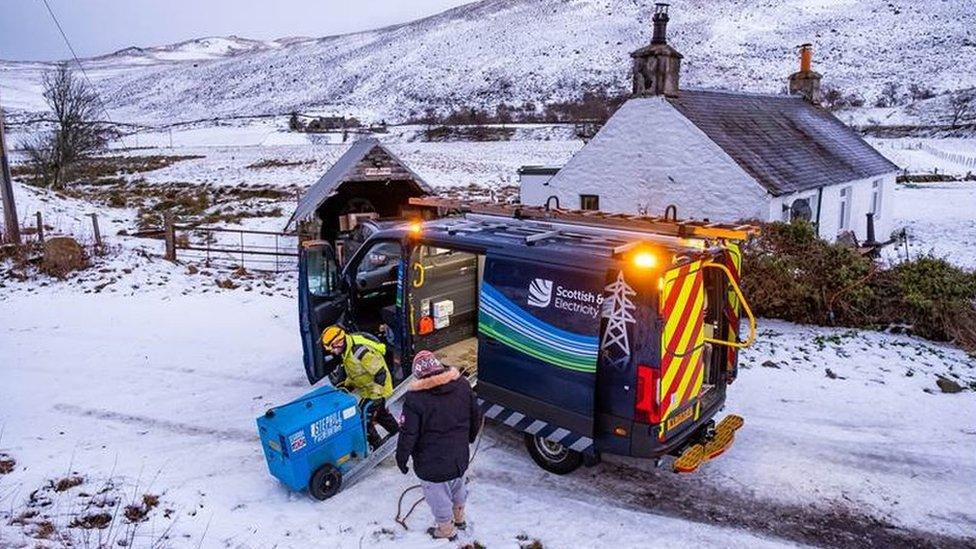
Thousands of people are still without power in Scotland and northern England, six days after Storm Arwen hit the UK.
About 16,000 homes did not have electricity, Boris Johnson said, with the majority expected to have supply restored by the end of the week.
A major incident has been declared in County Durham, meaning extra support can be provided to the thousands of people still without power.
Three people died as the storm brought high winds and cold weather on Friday.
Among them was 35-year-old David Lapage, who died after his truck was struck by a falling tree in Aberdeenshire.
Downing Street has said it is in "hourly contact" with network operators and is working urgently to ensure welfare and shelter is provided to those who need it.
The prime minister said about 120 military personnel were being drafted in to help the recovery effort in the Grampian region of Scotland.
Mr Johnson said: "It was a very, very big storm. We are doing everything we can to to help people."
He said that while there had been about 19,000 homes without power on Thursday morning about 3,000 had now had electricity restored.
"That is no consolation for the 16,000 who are still suffering but we are working flat out to help you," he added.
Welfare centres have been set up and in some cases energy suppliers have found emergency accommodation and provided generators and food vans to support communities without power.
But some residents have criticised utility companies for "woeful" communication and have said they feel forgotten.
Some properties - particularly in remote areas - may not get electricity before Saturday, energy suppliers have warned.
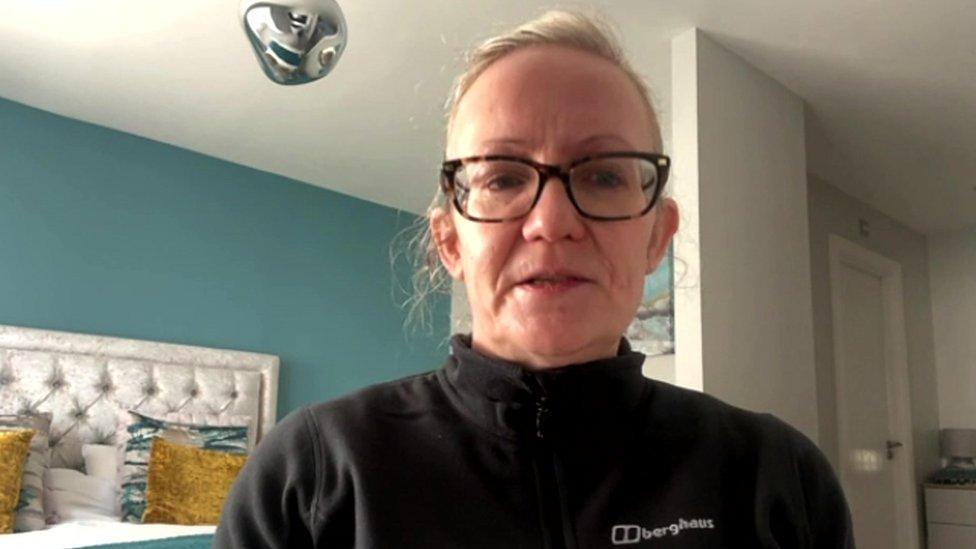
Sara Stanley said she was unable to leave her home for a hotel as she was self-isolating with Covid
Durham County Council said the decision to declare a major incident had been made as Northern Powergrid was "not yet in a position to confirm when supplies will be reinstated to all properties".
It means additional support from the council and emergency services will be made available to people hit by a loss of power.
Laura and David Venner have been temporarily housed in a Newcastle hotel with their four children - three of whom are disabled - since Sunday, after losing power at their home.
"It was absolutely freezing," Mrs Venner said. "I broke down at 6am and said 'we've got to leave.'"
Cold temperatures could make their children "seriously ill", she said, adding that while they were grateful being in a hotel was "far from ideal" as they were unable to bring medical equipment their children needed.
Their power was restored on Thursday and Mrs Venner said it felt like a "massive Christmas present that's just come early" to be able to get back to normality.
"Electricity, warmth and lighting everybody takes for granted every day. We've been without, I really won't take it for granted any more," she said.
Sara Stanley, from Medburn in Northumberland, told BBC News she had been without power until Tuesday when, after pressure from residents, a generator was provided for her estate.
She said it had been "a bit grim" as she had tested positive for Covid and thought she would have ended up in hospital if not for the generator.
She said the initial advice had been to go to a hotel or stay with relatives - but she was not able to as she was required to self-isolate.
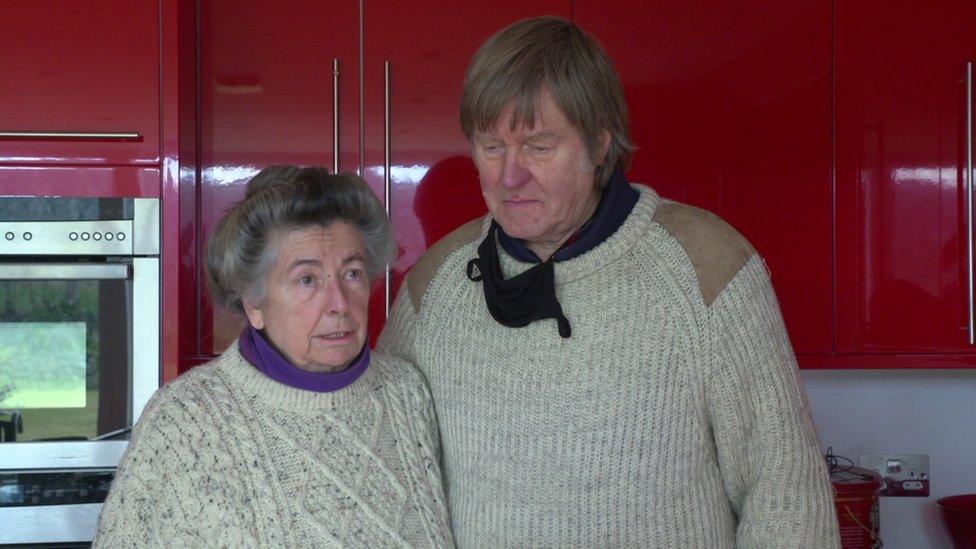
Linda Dunk said she expected more power cuts over the winter due to damage to infrastructure
Linda Dunk had the power restored to her Aberdeenshire home on Thursday afternoon after six days without heating, light or water.
She told BBC News they were going to get a generator as she thought the infrastructure had been so badly damaged there may be more problems later this winter.
"I don't want to spend another six days like this, I'm too old," she said. "I want to go to bed not worrying about these sorts of things."
Tony and Nicola Hills from Kirkby Lonsdale, Cumbria, have had to move out as they and their five children were "struggling to keep warm, washed and properly fed".
In a letter to his MP Mr Hills described Electricity North West's call centres and IT systems as "woefully inadequate", adding that he had received a text saying they had been reconnected when they had not.
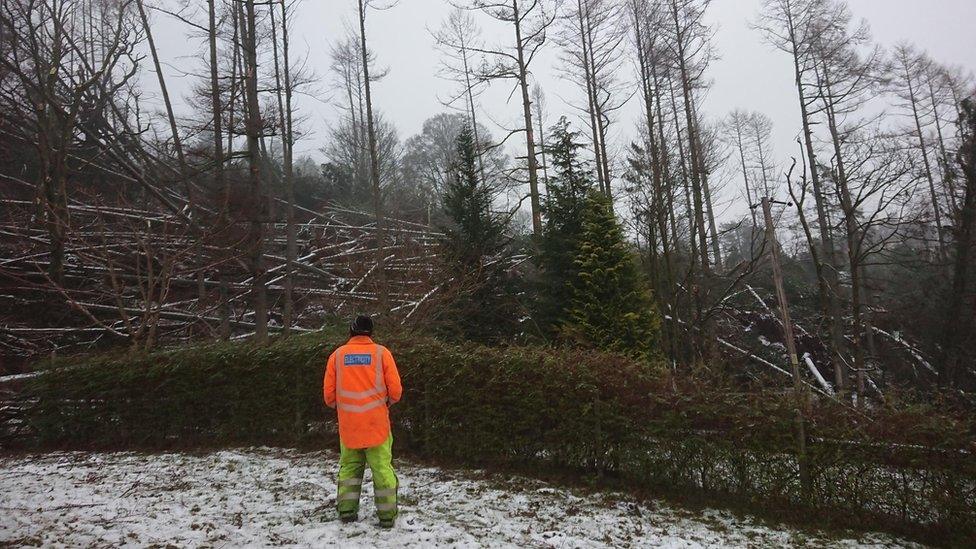
Many power lines have been damaged by falling trees
The ongoing efforts to restore power come as cold weather, including rain and sleet, is expected across the UK.
The Met Office said more snow is expected to hit Scotland, external on Friday, while rain is predicted for the north western parts.
Energy suppliers have said they are working to fix power cuts but there are still outages in some areas, this includes:
Northern Powergrid, which covers the North East of England, Yorkshire and north Lincolnshire, said 6,600 properties remain cut off. It had said it would not be able to restore all supplies - especially in remote areas - before the weekend
Electricity North West said 2,000 customers remained without power as of 14:30 GMT on Thursday, and said they were confident no customers would be without after the weekend
Scottish and Southern Electricity Networks (SSEN) said 3,100 customers still did not have electricity in Scotland. It said it aimed to reconnect all customers by Friday, but that some might not have it till Saturday
In the south of Scotland, Scottish Power Energy Networks said it was working to restore the "few hundred customers in the Borders without power".
The last homes in Wales that were still without power following the storm were reconnected on Wednesday.
Energy regulator Ofgem has said it will examine the speed of energy companies' responses, external and the resilience of the UK power network in extreme weather.
Labour's shadow environment secretary Jim McMahon said the government had "mostly abandoned" those without power, particularly in rural and remote areas. He called for the government to "ensure there is resilient infrastructure across the country to stand up to the more severe storms".

Are you in an area affected by Storm Arwen? Share your experiences by emailing haveyoursay@bbc.co.uk, external.
Please include a contact number if you are willing to speak to a BBC journalist. You can also get in touch in the following ways:
WhatsApp: +44 7756 165803
Tweet: @BBC_HaveYourSay, external
Please read our terms & conditions and privacy policy
If you are reading this page and can't see the form you will need to visit the mobile version of the BBC website to submit your question or comment or you can email us at HaveYourSay@bbc.co.uk, external. Please include your name, age and location with any submission.

ONE OF THE MOST DRAMATIC PERIODS IN MODERN ROYAL HISTORY: The Princes and the Press
A PROBLEM THAT STARTS IN SCHOOL?: Zara McDermott investigates sexism and 'rape culture' in Britain

Related topics
- Published2 December 2021

- Published2 December 2021
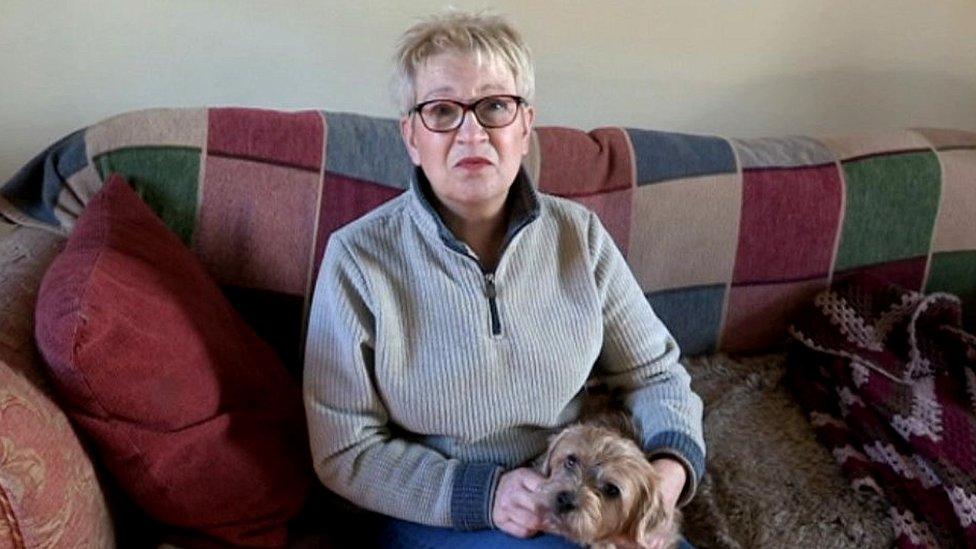
- Published2 December 2021
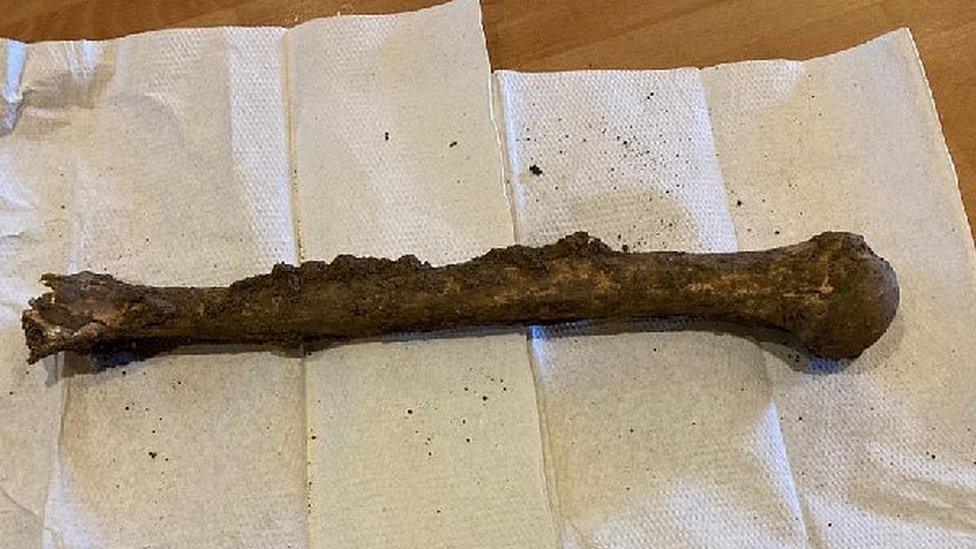
- Published2 December 2021
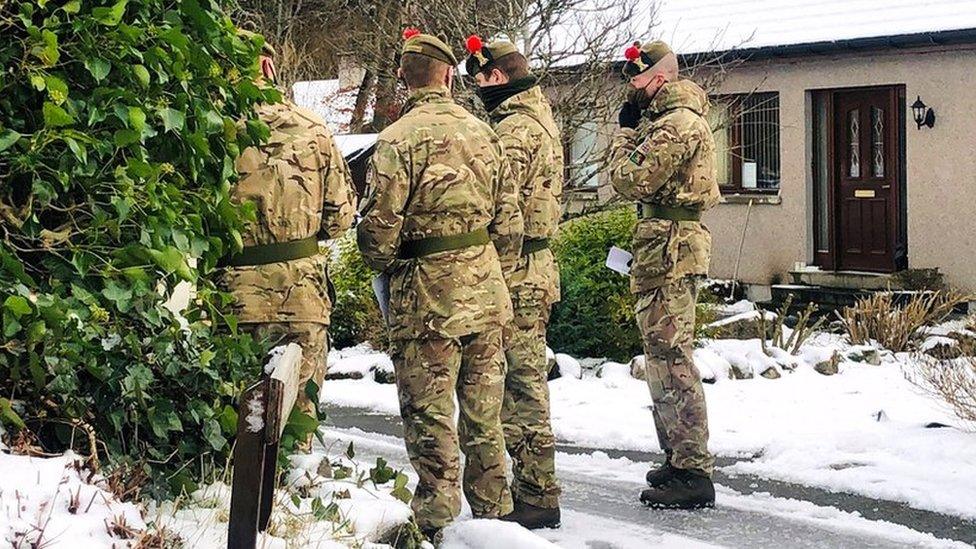
- Published1 December 2021
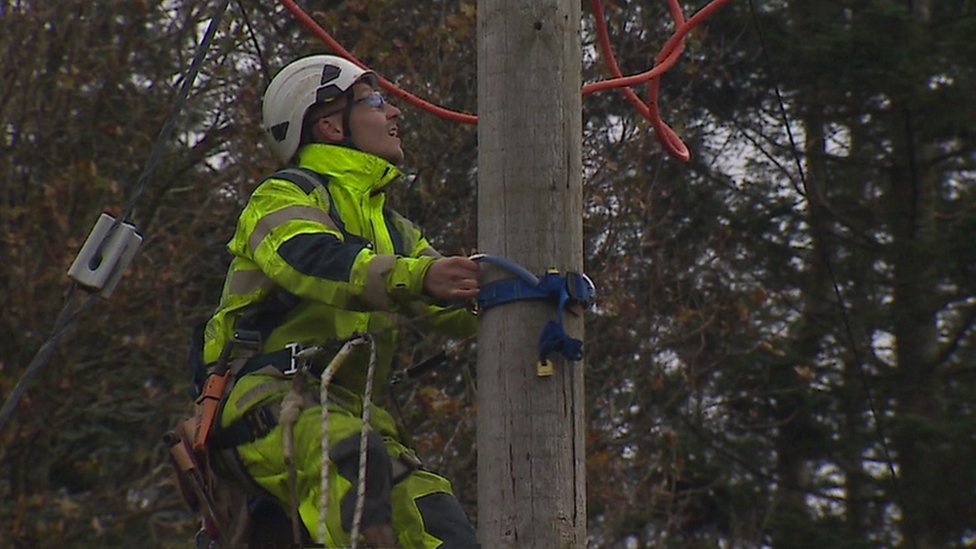
- Published1 December 2021
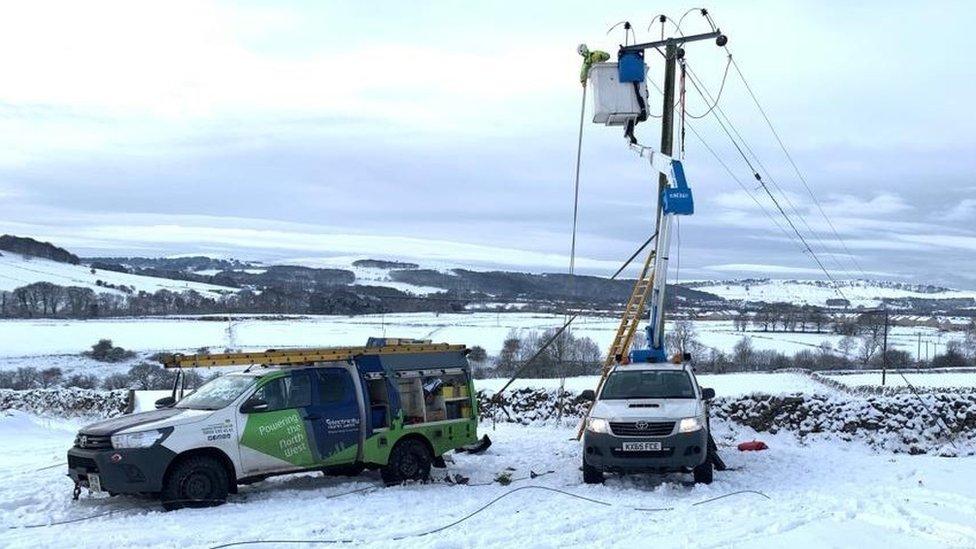
- Published29 November 2021
